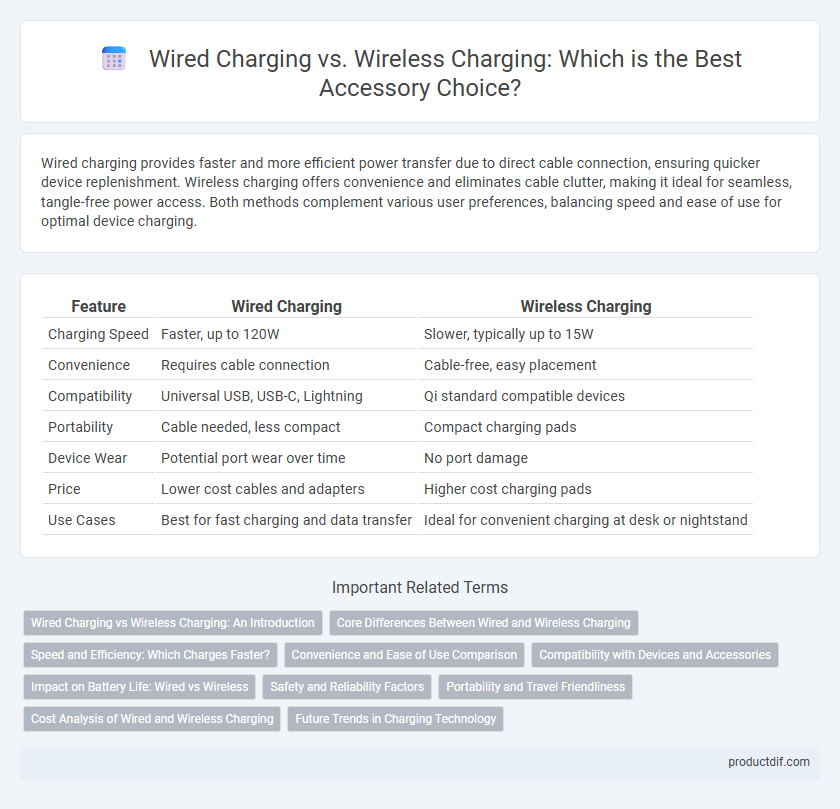Wired charging provides faster and more efficient power transfer due to direct cable connection, ensuring quicker device replenishment. Wireless charging offers convenience and eliminates cable clutter, making it ideal for seamless, tangle-free power access. Both methods complement various user preferences, balancing speed and ease of use for optimal device charging.
Table of Comparison
| Feature | Wired Charging | Wireless Charging |
|---|---|---|
| Charging Speed | Faster, up to 120W | Slower, typically up to 15W |
| Convenience | Requires cable connection | Cable-free, easy placement |
| Compatibility | Universal USB, USB-C, Lightning | Qi standard compatible devices |
| Portability | Cable needed, less compact | Compact charging pads |
| Device Wear | Potential port wear over time | No port damage |
| Price | Lower cost cables and adapters | Higher cost charging pads |
| Use Cases | Best for fast charging and data transfer | Ideal for convenient charging at desk or nightstand |
Wired Charging vs Wireless Charging: An Introduction
Wired charging delivers faster power transfer through direct cable connectivity, making it ideal for rapid battery replenishment and consistent energy flow. Wireless charging offers convenience by eliminating cables, using electromagnetic fields to transfer energy, but typically at slower speeds compared to wired methods. Understanding the trade-offs between speed, convenience, and device compatibility helps users choose the optimal charging solution for their accessories.
Core Differences Between Wired and Wireless Charging
Wired charging delivers faster and more consistent power transfer through direct cable connection, ensuring higher efficiency and quicker battery replenishment. Wireless charging relies on electromagnetic induction, offering convenience and cable-free use but typically slower charging speeds and increased energy loss. Core differences include charging speed, energy efficiency, and ease of use, with wired charging favored for performance and wireless for flexibility.
Speed and Efficiency: Which Charges Faster?
Wired charging typically offers faster charging speeds and higher efficiency due to direct power transfer, often delivering up to 65W or more with compatible chargers. Wireless charging, although convenient and increasingly efficient with standards like Qi 1.2 and PowerShare, generally operates at lower wattages, commonly around 10W to 15W, resulting in slower charge times. Despite improvements in wireless technology, wired charging remains the preferred choice for rapid and efficient energy transfer to devices.
Convenience and Ease of Use Comparison
Wired charging offers faster power transfer and consistent connectivity, making it ideal for users prioritizing speed and reliable energy delivery. Wireless charging provides superior convenience by eliminating cable clutter and enabling effortless device placement, enhancing ease of use in daily routines. Choosing between the two depends on the balance between rapid charging needs and the desire for a cable-free setup.
Compatibility with Devices and Accessories
Wired charging offers broad compatibility with a wide range of devices and accessories, supporting various connector types such as USB-C, Lightning, and Micro-USB, which ensures fast and reliable power delivery. Wireless charging standards like Qi provide convenience for compatible smartphones, earbuds, and smartwatches, but device support can be limited by differing power outputs and alignment sensitivity. Choosing between wired and wireless charging depends largely on the specific device ecosystem and accessory compatibility requirements.
Impact on Battery Life: Wired vs Wireless
Wired charging typically preserves battery health better by delivering a consistent and controlled current, reducing heat generation that can degrade battery capacity over time. Wireless charging tends to generate more heat due to electromagnetic energy transfer, accelerating battery wear and reducing overall lifespan. Battery longevity is optimized with wired charging, especially when using fast chargers with built-in temperature control and voltage regulation features.
Safety and Reliability Factors
Wired charging offers more consistent power delivery and lower risk of overheating due to direct current flow, enhancing overall safety and reliability. Wireless charging may generate excess heat and has variable efficiency depending on device alignment, which can impact battery health over time. Quality certifications like Qi standards ensure safer operation for both wired and wireless charging accessories.
Portability and Travel Friendliness
Wired charging offers faster power delivery but requires carrying cables and adapters, which can add bulk and limit portability during travel. Wireless charging eliminates the need for cables, providing greater convenience and ease of use, especially in airports or hotels, but often charges devices slower and requires compatible charging pads. For frequent travelers prioritizing minimal gear, wireless charging enhances travel friendliness, while wired charging remains ideal for quick, reliable power on the go.
Cost Analysis of Wired and Wireless Charging
Wired charging typically offers a lower upfront cost due to the affordability of cables and standard adapters, making it a budget-friendly option for most users. Wireless charging devices often require specialized pads and compatible components, resulting in higher initial investment and occasional replacement expenses. Over time, wired chargers tend to incur minimal additional costs, while wireless charging may involve extra expenses for efficient and fast-charging models.
Future Trends in Charging Technology
Future trends in charging technology emphasize faster, more efficient wireless charging with improvements in magnetic resonance and near-field communication (NFC) techniques, enabling seamless power transfer across greater distances. Advanced materials such as graphene and silicon carbide are expected to enhance wired charging speeds while reducing heat generation, supporting ultra-fast and environmentally friendly solutions. Integration of AI-driven charging systems will optimize energy distribution based on device usage patterns, promoting smarter and more sustainable accessory ecosystems.
Wired charging vs wireless charging Infographic

 productdif.com
productdif.com